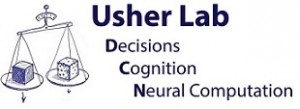
Rani Moran
Ph.D. StudentRani Moran
E-mail: rani.moran@gmail.com
Research Interests
The overarching goal of my research is to better understand human behavior by developing computational models of human cognition. In my research, I combine my understanding of mathematical and computational principles with my expertise in complex statistical methods and data-analysis to address diverse domains of cognition. I am interested in how people represent their environment and how they adjust their representations and consequent behavior to changing environmental conditions so as to maintain efficient performance.
I believe that the study of normative and optimal models for performance provides an important benchmark and a guiding framework for understanding "real" behavior. When people are found to perform optimally, our understanding as to how such optimal behavior is produced may be advanced by probing their behavior (e.g., which processing algorithms are executed and/or which adaptation mechanisms are used). However, because organisms are generally assumed to adapt efficiently to their environment, deviation from optimality may sometimes be even more striking than compliance with optimality. Such deviations underlie theory refinement and contribute to a better characterization of human goals, capacities and resources.
My Ph.D. research evolved around two main domains. The first focused on extending sequential sampling models to account for human performance in complex decision situations such as: detecting signals under conditions of temporal or spatial uncertainty (the latter is the visual search task) , deciding optimally in heterogeneous and biased environments (that is, when trials vary randomly in difficulty and one response option is a-priori more likely to be correct than the other), or following choices with meta-cognitive confidence judgments. Accounting for performance in these tasks required augmenting standard models with additional strategic-dynamic components. These components inform us about the multifaceted role played by flexible top-down control mechanisms in the service of efficient performance. My second domain of research focused on episodic memory and particularly on models of free-recall and recognition memory. Here, I studied the nature of the relationship between the processes that sub-serve memory: Recollection and Familiarity. To learn more, please check out my publications below!
Publications (*,** denote equally contributing authors)
Moran, R., Liesefeld, H. R., Müller, H. J., & Usher M. (In press). An appeal against the item's death sentence: Accounting for diagnostic data patterns with an item-based model of visual search. Behavioral and Brain Sciences.
Müller, H. J., Liesefeld, H. R., Moran, R., & Usher M. (In press). Parallel attentive processing and pre-attentive guidance. Behavioral and Brain Sciences.
Moran, R. (2016). Though shalt identify! The identifiability of two high-threshold models in confidence-rating recognition (and super-recognition) paradigms. Journal of Mathematical Psychology, 73, 1-11.
Tsetsos, K., Moran, R., Moreland, J., Chater, N.*, Usher, M.*, & Summerfield C.* (2016). Economic irrationality is optimal during noisy decision-making. Proceedings of the National Academy of Sciences. doi: 10.1073/pnas.1519157113.
Liesefeld, H. R., Moran, R., Usher, M., Müller, H. J., & Zehetleitner, M. (2016). Search efficiency as a function of target saliency: the transition from inefficient to efficient search and beyond. Journal of Experimental Psychology: Human Perception and Performance. Advance online publication. http://dx.doi.org/10.1037/xhp0000156
Teodorescu, R. A., Moran, R., & Usher, M. (2016). Absolutely relative or relatively absolute: violations of value invariance in human decision making. Psychonomic Bulletin & Review 22, 22-38. doi: 10.3758/s13423-015-0858-8. [File; SI]
Moran, R., Zehetleitner, M., Liesefeld, H. R., Müller, H. J., & Usher M. (2015). Serial vs. parallel models of attention in visual search: accounting for benchmark RT-distributions. Psychonomic Bulletin & Review. doi:10.3758/s13423-015-0978-1
Bronfman, Z. Z.*, Brezis, N.*, Moran. R. , Tsetsos, K., Donner, T.** & Usher, M.**. (2015). Decisions reduce sensitivity to subsequent information. Proceedings of the Royal Society of London B: Biological Sciences, 282. pii: 20150228. doi: 10.1098/rspb.2015.0228. [File; SI]
Sadeh, T., Moran, R., & Goshen-Gottstein, Y. (2015). When items ‘pop into mind’: variability in temporal-context reinstatement in free-recall. Psychonomic Bulletin & Review, 22, 779-790. [File; SI]
Moran, R., & Goshen-Gottstein, Y. (2015). Old processes new perspectives: Familiarity is correlated with (not independent of) recollection and is more (not equally) variable for targets than for lures. Cognitive Psychology, 79, 40-67. [File; Presentation]
Moran, R., Teodorescu, R. A., & Usher, M. (2015). Post choice information integration as a causal determinant of confidence: Novel data and a computational account. Cognitive Psychology, 78, 99-147. [File; Presentation]
Moran, R. (2015). Optimal decision making in heterogeneous and biased environments. Psychonomic Bulletin & Review, 22, 38-53. [File]
Brainerd, C. J., Gomes, C. F. A., & Moran, R. (2014). The two recollections. Psychological Review, 121, 563-599. [File; SI]
Moran, R., & Goshen-Gottstein, Y. (2014). The conditional-recency dissociation is confounded with nominal recency: Should unitary models of memory still be devaluated? Psychonomic Bulletin & Review, 21, 332-343. [File; SI]
Moran R.*, Zehetleitner, M.H.*, Muller, H. J., & Usher, M. (2013). Competitive guided search: Meeting the challenge of benchmark RT distributions. Journal of Vision, 13, 1–31. [File; App1, App2, App3]
Osmmy, O.*, Moran, R.*, Pfeffer, T., Tsetsos, K., Usher, M.**, & Donner, T.** (2013). The time scale of perceptual evidence integration can be adapted to the environment. Current Biology, 23, 981–986. [File; SI]
Shachar, A. B., Lazarov, A., Goldsmith, M., Moran, R., & Dar. R. (2013). Exploring metacognitive components of confidence and control in individuals with obsessive-compulsive tendencies. Journal of Behavior Therapy and Experimental Psychiatry, 44, 255-261. [File]
